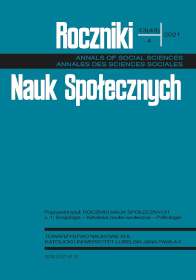From the Diary of a Senior Citizen—War Memories of a Difficult Childhood
Abstract
This article is based on the diaries of seniors whose childhoods were during World War II. The war years left their mark on the lives of those who experienced this difficult period. Carefree childhood was brutally interrupted. The time immediately after the end of hostilities was not an easy one either. Children had to grow up quickly, work early, get an education under difficult conditions. The quality of childhood was determined by many factors, such as origin and social position, economic situation of the family, place of residence, family situation, and state of health. The correlations of these factors had a great impact on the course of childhood. Traumatic memories remained in the minds of the seniors. Memoirs showing the past time are a rich source of knowledge about human life, about the family, about the difficulties of life. They are a kind of historical transmission of very subjective experiences, they reflect the past time to show the reality of those events to the young generation. Memoirs in this way have an educational but also therapeutic function for the authors themselves.
References
Boruta M. (2017), Nazwisko jako fundament tożsamości poza Ojczyzną. Gruzińska gałąź Poniatowskich, Kraków: UP.
Całek A. (2016), Biografia jako reprezentacja, Annales Universitatis Paedagogicae Cracoviensis. Studia Poetica, vol. 4, s. 25-41.
Dubas E. (2014), Edukacja w andragogicznych badaniach biograficznych – biografia edukacyjna, [w:] R. Skrzyniarz, E. Krzewska, W. Zgłobicka-Gierut (red.), Badanie biografii – źródła, metody, konteksty, Lublin: Episteme, s. 17-31.
Lalak D. (2014), Biograficzność jako proces kształtowania życia – uczenie się z życia i jego konsekwencje rozwojowe, [w:] R. Skrzyniarz, E. Krzewska, W. Zgłobicka-Gierut (red.), Badanie biografii – źródła, metody, konteksty, Lublin: Episteme, s. 33-51.
Ptak A. (2017), Dom bez korzeni, Kraków: Wydawnictwo Signo.
Skrzyniarz R. (2014), Biografia ruchoma, zmienna, niestabilna – przyszłość zmienia się w zależności od tego, jak patrzymy na przeszłość, [w:] R. Skrzyniarz, E. Krzewska, W. Zgłobicka-Gierut (red.), Badanie biografii – źródła, metody, konteksty, Lublin: Episteme, s. 85-96.
Szacka B. (2003), Wprowadzenie do socjologii, Warszawa: Oficyna Naukowa.
Włodarek J., Ziółkowski M. (1990), Teoretyczny i empiryczny status metody biograficznej we współczesnej socjologii, [w:] J. Włodarek, M. Ziółkowski (red.), Metoda biograficzna w socjologii, Warszawa–Poznań: PWN, s. 3-9.
Znaniecki F. (1924), Metoda autobiograficzna w socjologii, [w:] J. Szacki (red.) (1995), Sto lat socjologii polskiej. Od Supińskiego do Szczepańskiego, Warszawa: Wydawnictwo Naukowe PWN, s. 580-585.
Copyright (c) 2021 Roczniki Nauk Społecznych

This work is licensed under a Creative Commons Attribution-NonCommercial-NoDerivatives 4.0 International License.


